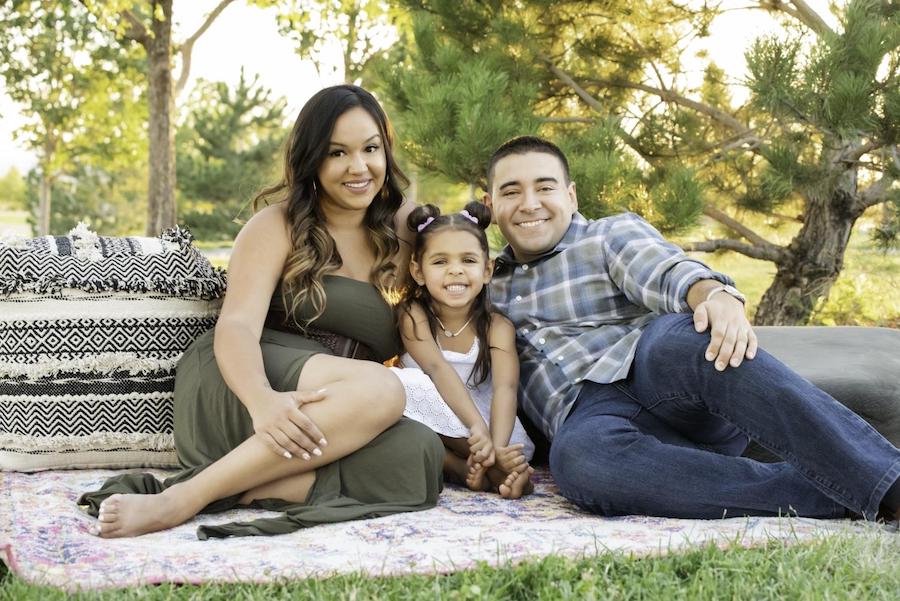
“Calm Down, You’re Fine, You’re Not Failing”
When her daughter Isa was first born, Camila was not the kind of mother who immediately knew what to do. She had always been focused on her career, and had not spent much time around babies and young children. When it was time to change her daughter’s first diaper, she had to ask a hospital nurse how to do it.
During the early days at home with her daughter, Camila said her home visitor helped her feel more confident and build her skills as a mother. Home visiting is a free program that pairs families with a trained home visitor who comes to their house (or visits virtually) to support families with their new baby. Home visitors can provide information about child development, can be a supportive ear during stressful times, and can help connect families with other supports they might need.
For Camila, her home visitor helped her deal with feelings of self-doubt about her parenting, and with her own feelings of isolation during the early weeks after Isa’s birth. Camila missed the companionship of adults and career, and judged herself for that feeling.
“I just remember always having this fear of, ‘Oh my gosh, that’s probably not right.’ Whatever the baby’s doing or however I’m feeling, is probably not right. I’m supposed to love these weeks with my baby and I’m supposed to love watching her sleep, and I do for five minutes, but then I need something else. And I feel like people are not honest about that.”
She said her home visitor helped her feel less alone and uncertain, and advised her when she had specific questions about Isa’s development. At two weeks old, Isa began flipping from her tummy to her back—a skill more typical for babies at least four months old. Camila worried.
“I’m freaking out. I’m like, oh my gosh, there is something wrong with my baby; she might be a super hero, I don’t know what’s going on here, I can’t do this,” Camila said. “I just remember my home visitor always telling me, calm down, you’re fine, you’re not failing … it’s a fair question, this isn’t typical, but it doesn’t mean it’s wrong. And she helped me calm down, and talk to her pediatrician and have her muscle measured and all of these things.”
Fast forward 18 months. With Isa now a toddler, Camila noticed that she wasn’t talking very much. Camila mentioned it to her pediatrician, who advised that they wait and see, but Camila had a feeling that something wasn’t quite right.
“I just noticed that she wasn’t able to communicate with her peers, she wasn’t playing with her peers, which was a concern for us—it just made us wonder why. Especially at that age, she couldn’t communicate her feelings, her needs.”
By the time Isa turned two, Camila decided it was time to get some help. She contacted the Family Infant Toddler program (FIT for short), and a FIT professional came to their home and evaluated Isa. They found that she had a significant speech delay, as well as a delay in social-emotional skills.
FIT is a free program for families with children from birth to age three. FIT professionals evaluate children for possible developmental delays and disabilities, and provide supports to children who need them. Supports are completely voluntary, are provided in a convenient place and time for families, and are always free.
For Camila’s family, Isa’s supports were provided during her child care day, so they never took away from family time. “They all took place in child care, which was really important for us because, as a working mom, I didn’t want the three hours I had with my child every day to be taken up by therapy,” Camila said.
And right away, Camila started to notice improvements in Isa’s speech. “I would say within six months her vocabulary doubled,” she said. And as Isa’s communication skills improved, her social-emotional skills developed along with them. “She started wanting to play with other kids, she was able to communicate with me, what she needed. So we started talking about things she liked, and things she didn’t like, and she didn’t have as many fits anymore because she could use words to express her frustration and her desires, and that was a big, big change for us.”
The skills that Isa learned through FIT helped her development, and also helped Camila have a calmer relationship with her toddler.
“I would honestly say that the relationship between her and I, even at two-and-a-half, it was easier than what it had been,” Camila said. “For me it was also the peace of mind of knowing that I was doing everything I could do to ensure that my child was successful.”
Want to learn more?
For families raising young children in New Mexico, there is free help available every step of the way. There are home visiting programs for families with new babies, and child care assistance to help pay for child care. There is the FIT program for young children who need support with their development, and PreK programs to help three- and four-year-olds get ready for kindergarten.
You can find out more about home visiting at this website, and can also check out New Mexico’s FIT handbook for families. If you’re ready to search for a program in your area, you can start your web search at this portal, or call 1-800-691-9067 to speak to a real person who can help you find early childhood services for your family. Leave a voicemail, and someone will get back to you in 24 hours or less.
Did you find this article helpful?
Subscribe to Bright By Text to get more free tips and resources for your child’s journey, right to your phone!
